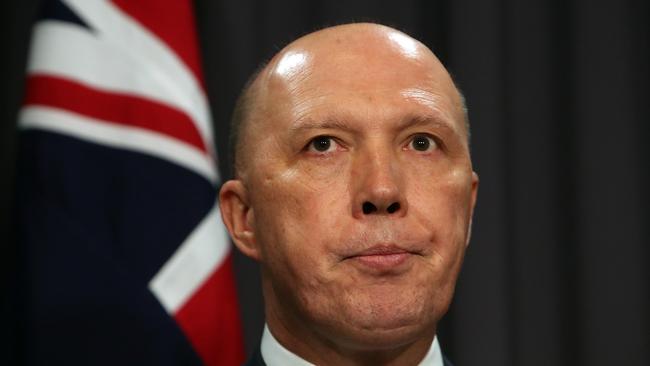MPs wage war over terrorist exile bill
Peter Dutton has accused Mark Dreyfus of seeking to push left-wing outcomes on national security.

Home Affairs Minister Peter Dutton has declared he will no longer be beholden to advice from the parliamentary security and intelligence committee, with Labor accusing him of breaking the convention of bipartisanship on national security.
With the foreign fighters bill expected to pass the Senate today, which will prevent Australian jihadis from re-entering Australia for up to two years, Mr Dutton staunchly defended pushing the reform without backing all recommendations from the bipartisan Parliamentary Joint Committee on Intelligence and Security.
Mr Dutton said he would not take advice from the committee — which is co-chaired by Liberal MP Andrew Hastie and Labor MP Anthony Byrnes — as much as he did in the last parliament. The committee is made up of six Liberal MPs and five Labor MPs.
He accused a Labor member of the committee, opposition legal affairs spokesman Mark Dreyfus, of using the PJCIS to push left-wing outcomes on national security.
“We are not going to be forced into a position, which I think we were in the last parliament, where Mark Dreyfus waters every bill down,” Mr Dutton said.
“That keeps the Left of the Labor Party (happy) and it was convenient for Mr Shorten who was leader at the time. We are not going to allow that to happen … (otherwise) we end up with a bill that is ineffective. And these matters are too important for that.
“So Anthony Albanese can manage Mr Dreyfus in a different process but I am not going to allow our national security agencies to be stifled.”
Mr Dreyfus accused Mr Dutton of conducting a national security debate with “personal abuse”.
“National security legislation should be measured against the national interest. It should be measured against effectiveness and should be measured by reference to the rights of Australians, the need to protect our safety, how we balance that with safeguards — all of these things,” Mr Dreyfus said.
“That is what a national security debate should be about, not this kind of pathetic, infantile personal abuse that Mr Dutton is engaging in. He seems to have some kind of weird obsession with me.”
The government argues the laws are necessary to block the entry of returning jihadis who have fought for Islamic State, al-Qa’ida and other terror groups in the Middle East.
Mr Dutton said the laws would not render people stateless but help the government “manage” returning fighters, including through tracking their entry.
The legislation was stalled in the Senate last night as Labor sought to amend it to bring the bill into line with all 18 recommendations made by the PJCIS. The government did not embrace two of the committee’s proposed changes to the legislation as tabled in the last parliament.
The recommendations not being adopted by the government would impose a restriction that would prevent the minister from making a temporary exclusion order unless the government reasonably suspected an individual was involved in terrorism-related activities outside Australia.
The committee also recommended a temporary exclusion order could be made only if it would substantially assist in preventing the provision of support for, or the facilitation of, a terrorist act. The government chose not to incorporate this in its bill.




To join the conversation, please log in. Don't have an account? Register
Join the conversation, you are commenting as Logout